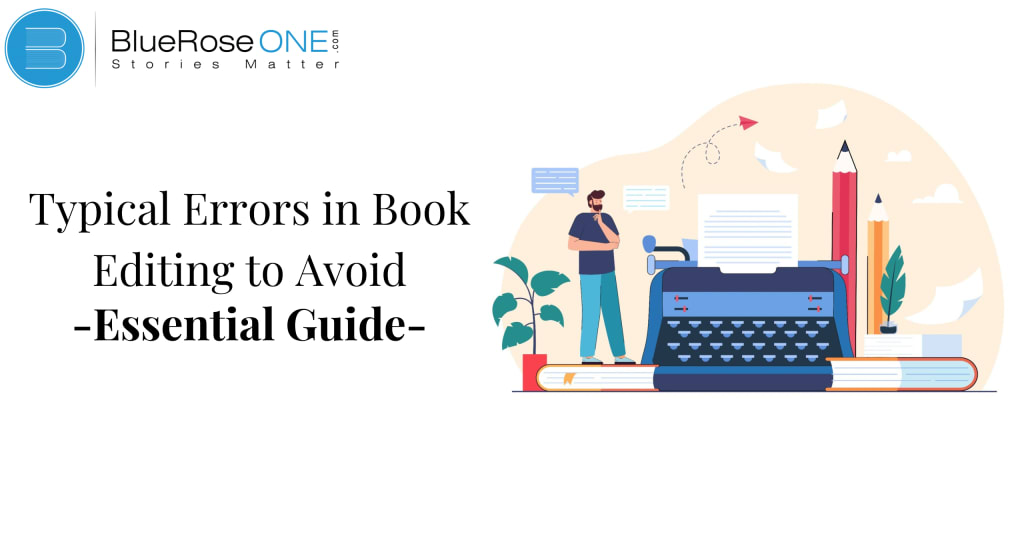Typical Errors in Book Editing to Avoid | Essential Guide
Guide to Book Editing

Book editing is a crucial step in the publishing process that occurs between finishing a manuscript and producing the finished product. It includes a number of procedures designed to improve the text’s general quality, coherence, and clarity. But in the rush of finishing a manuscript, writers sometimes forget about the crucial book editing stage, which can have negative effects on how well and widely their work is received.
Skipping the Editing Process
A crucial error that many prospective writers make is to skip the book editing process, particularly when it comes to book editing. Book editing involves more than just correcting typos and grammar; it also involves polishing the entire document to guarantee cohesion, consistency, and clarity.
If authors skip this important phase, they run the risk of giving readers a poor product, which will damage their credibility and reputation. Multiple rounds of revision, consulting with professional editors or beta readers for comments, and painstaking attention to detail are all necessary for effective book editing.
In the end, putting time and energy into the book editing process is crucial to creating a polished, expert work that appeals to readers.
Neglecting Structural Editing
In the world of book editing, neglecting structural book editing is a sin. This important stage deals with the overall structure of your manuscript, making sure that it makes sense and flows naturally. It’s the blueprint that creates the whole story world, but in the rush to perfect syntax or text, it gets neglected.
Disregarding structural book editing, however, can lead to a convoluted plot, a disconnected plotline, and uninterested readers. If writers skip this crucial stage, they run the danger of jeopardizing the accuracy and efficacy of their writing. Prioritize structural book editing as the cornerstone of your editing process to avoid this trap and create a strong basis for literary achievement.
Overlooking Copy Editing
For any author, neglecting copy editing can be a very serious mistake when it comes to book editing. Ignoring this important step might lead to a host of unnoticed mistakes, such as typos and grammatical problems, which will eventually lower the book’s overall quality. As the last coat of polish, copy editing guarantees consistency, professionalism, and clarity across the work.
Writers need to understand how important it is to polish their writing in order to satisfy readers’ expectations and industry standards. Authors can reach new heights with their work, enthralling readers and making a significant literary impact, by giving careful copy editing top priority.
Ignoring Proofreading
In the world of book editing, failing to proofread is a grave offense. It’s like throwing up the door for mistakes and inconsistencies to find their way into the finished product. However, a lot of prospective writers make this mistake, endangering the honesty and competence of their writing.
Ignoring proofreading can lead to awkward mistakes in grammar, spelling, and structure that make reading difficult for the reader. Adopting precise proofreading procedures is not only advised, but necessary in the exacting craft of book editing. It guarantees the well-polished appearance that sets a properly edited book apart from an unfinished manuscript.
Failing to Maintain Consistency
One of the most important—yet sometimes disregarded—aspects of book editing is uniformity across the manuscript. Inconsistencies in storytelling can cause readers to become perplexed and, eventually, diminish the overall quality of the book.
These variations, which can include inconsistent character attributes, inconsistent timelines, or stylistic changes, can make it difficult for the reader to fully immerse themselves in the narrative. Strict attention to detail is necessary for effective book editing, so that everything lines up perfectly from start to finish.
Editors can maximize the coherence and readability of the final product and bring the author’s work to the highest level by emphasizing uniformity.
Misusing Punctuation and Grammar
One of the most common mistakes authors make when editing their books is to utilize incorrect grammar and punctuation. This error can undermine a manuscript’s cohesion and clarity, confusing readers and lessening the work’s overall impact.
These mistakes, which can include an excessive dependence on commas, mixing up their, their, and they’re, or using a lot of run-on sentences, can damage the author’s authority and professionalism.
Plot and character development are important aspects of book editing, but it also requires careful attention to linguistic nuances so that punctuation and grammar support the reader’s experience rather than detract from it...Continue reading





Comments (1)
Hey, just wanna let you know that this is more suitable to be posted in the Writers community 😊